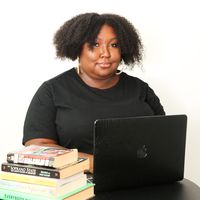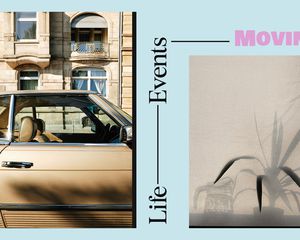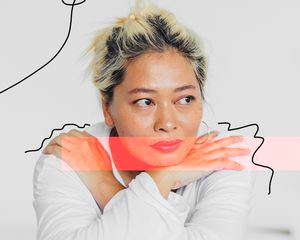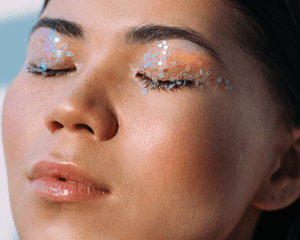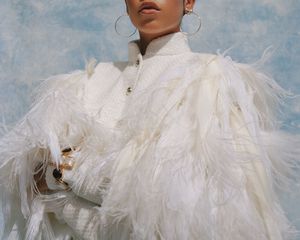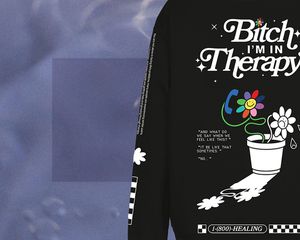:max_bytes(150000):strip_icc()/Byr_Psychohairapy_Recirc-8ae31b1ed83046a5a96a41d345caf427.jpg)
Byrdie
Dr. Afiya Mbilishaka's beauty career began flourishing while living in her college dorm, but her affinity for hair dates back to childhood. "I always loved doing hair," she says. "My friends and I, growing up, would go to each other's houses and try to do the latest trends with hair, all the baby hairs and zigzags. I was a kid of the '90s, and even at family cookouts, I would have a lawn chair set up and create different hairstyles for my cousins."
As a Black psychology student at the University of Pennsylvania, her hairstyling skills were "a tool of connection" in a space that didn't center her experience. She often styled friends' hair before formals and football games while engaging in intimate conversations about campus life. "It laid the basis for me to be a psychologist because people were really stressed, being at a demanding and competitive school and feeling isolated," she explains.
Mbilishaka offered her services for free, recognizing there was a greater purpose in the work she was doing. "I wasn't charging anyone, so it was a safe space for people to sort of unload," she notes. "I just enjoyed the process of connecting and storytelling. This was an opportunity for us to have private conversations."
Though Mbilishaka was on the path to becoming a psychologist, she loved doing hair so much that she considered making it her career path. She says one pivotal phone call with her aunt Brenda helped her figure out exactly what to do after graduation. "I said, 'I don't know if I want to study psychology or hair,' and she said, 'Why can't you do both?'" she recalls. "I don't think she was telling me to do both at the same time, but that's how I interpreted it, and I thought I could do hair and therapy together."
The Launch of PsychoHairapy
From there, the idea of PsychoHairapy was born. The practice uses "hair as an entry point into mental health care," and her company currently offers "a skills-based training course that teaches participants about mental health and hair."
In 2021, Mbilishaka left her position as the assistant professor of psychology + program coordinator at the University of the District of Columbia to dedicate herself to the company's mission full-time. "I took a complete leap of faith that I could do this work on my own without an institution," she says.
Through PsychoHairapy, Mbilishaka aims to expand the sacred relationship between the client and the hairstylist. "When we look at the African continent, [hairstylists] are following along the long line of traditional healers," she explains. "Hair care professionals were often in the position of initiated priests because of how sacred their work was."
The emotional support hairstylists provide has long been instrumental in helping clients look and feel their best (emphasis on the latter). "Of course, people can see the physical transformation that happens in the salon, but they're not recognizing the emotional transformation," she continues. "If you have a cut, you can get a band-aid. But what happens when you have a panic attack? Who's coming to care for you? A stylist or barber could if you're sitting in their chair and they're with you."
The Impact of PsychoHairapy
She says hairstylists who have taken her course have become emotional over realizing their work could have such a far-reaching impact. "They were already trying to support and affirm [clients], but there are certain skills [PsychoHairapy training provides] in terms of listening that [allow them to have] much deeper and meaningful conversations," she notes. With PsychoHairapy, Mbilishaka believes hair professionals can "rephrase and reframe some of the concerns coming up in their client's lives."
Mbilishaka's years of impactful work caught the attention of Maui Moisture earlier this year. The brand pledged to support her efforts by extending a partnership opportunity and a commitment of 100 thousand dollars. She accepted the offer after seeing Maui Moisture's track record of supporting community-based initiatives, like Beauty 2 The Streetz, a program founded by Shirley Raines offering grooming services to the unhoused population in Los Angeles. "They have partnered with people doing groundwork, community work, and using hair as part of their community work," Mbilishaka says. "Since I'm a community-based psychologist, that was a really strong way to make me feel attached to their previous work and believe they could support something I'm working on."
The Future of PsychoHairapy
Mblishaka says Maui Moisture's interest was confirmation she made the right choice in following her aunt's advice. "It confirmed my faith that I made a good decision to transition to be more community-focused," she says. "The partnership is giving me an opportunity to amplify my voice."
Ultimately, Mbilishaka's commitment to bridging mental health and hair care is about amplifying access. Mbilishaka envisions a future where the hundreds of thousands of licensed cosmetologists in the United States are able to provide Psychohairapy support to clients. "[I want to] make sure Black communities, in particular, have quality mental health care," she says.
